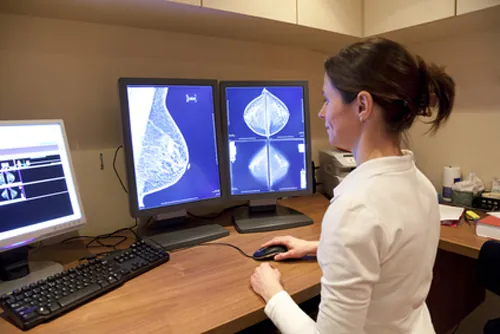
Breakthrough Study Reveals AI Mammography Screening Significantly Boosts Breast Cancer Detection Rates!
2025-01-15
Author: Nur
Recent Groundbreaking Research
Recent groundbreaking research has unveiled that artificial intelligence (AI) in mammography screening substantially enhances breast cancer detection rates while maintaining a steady recall rate for additional assessments. This multi-site study is the largest of its kind to date and was published in the esteemed journal, Nature Medicine.
The PRAIM Study
The PRAIM (Prospective Radiological AI Mammography) study involved an impressive sample of 463,094 women aged between 50 and 69 years, who underwent routine mammography screenings at 12 clinical sites across Germany from July 2021 to February 2023. In a novel approach, over half of the screening cases (56.3%) employed AI assistance during the radiologists' evaluations—an innovative method that may revolutionize the way breast cancer is detected.
Significant Results from AI Technology
Professor Alexander Katalinic, the lead investigator from the Institute of Social Medicine and Epidemiology at the University of Lübeck, shared the initial goals of the project. 'We aimed to show that AI evaluations could stand alongside human assessments,' he explained. 'However, the results exceeded our expectations—AI has demonstrated a significant improvement in detection rates.'
Overview of Vara MG Technology
The AI technology under study, Vara MG, developed by the German company Vara, is a certified medical device that enhances the examination process by highlighting potentially problematic areas in mammograms. The innovative system allows radiologists to opt for AI-supported evaluations, ensuring they can leverage cutting-edge technology to improve their diagnostic accuracy.
Detection Rates and Recall Consistency
When utilizing the AI-enhanced software, the results were notable. The study found the breast cancer detection rate was 6.7 cases per 1,000 women screened with the AI support, compared to only 5.7 in the standard control group—an impressive 17.6% relative increase in detection rates.
Remarkably, the recall rates for additional examinations remained consistent across both groups, with only a small difference: 37.4 per 1,000 for the AI group versus 38.3 per 1,000 in the control group. Katalinic emphasized the significance of this finding, stating that maintaining a similar recall rate prevents unnecessary anxiety and additional testing for the majority of women who do not have breast cancer.
Implications for Screening Process
In further simulations, if radiologists skipped the re-evaluation of cases flagged as ‘normal’ by the AI, the breast cancer detection rate would still be 16.7% higher in the AI group, while unnecessary recalls decreased by 15%. This suggests that AI not only improves detection but also streamlines the screening process without compromising patient care.
Future Prospects and Global Impact
The implementation of AI could have far-reaching implications, particularly given that radiologists in Germany analyze around 24 million mammograms each year. By integrating AI into the workflow, professionals like Katalinic argue that we could potentially reduce workload, allowing human experts to focus on more complex cases. 'The implementation of AI alongside established double-reading procedures could revolutionize mammography screening,' he asserted.
With these promising findings, both Katalinic and Stefan Bunk, Chief Technology Officer at Vara, recognized the global potential for AI integration into healthcare systems, calling for discussions on adopting such technologies in screenings worldwide. Future research will now pivot towards understanding the long-term impact of AI on patient outcomes and its seamless integration into routine clinical practices.
Conclusion
Stay tuned as the medical community explores this vital advancement on the path to improved breast cancer detection, which could change the lives of millions of women around the globe!
 Brasil (PT)
Brasil (PT)
 Canada (EN)
Canada (EN)
 Chile (ES)
Chile (ES)
 Česko (CS)
Česko (CS)
 대한민국 (KO)
대한민국 (KO)
 España (ES)
España (ES)
 France (FR)
France (FR)
 Hong Kong (EN)
Hong Kong (EN)
 Italia (IT)
Italia (IT)
 日本 (JA)
日本 (JA)
 Magyarország (HU)
Magyarország (HU)
 Norge (NO)
Norge (NO)
 Polska (PL)
Polska (PL)
 Schweiz (DE)
Schweiz (DE)
 Singapore (EN)
Singapore (EN)
 Sverige (SV)
Sverige (SV)
 Suomi (FI)
Suomi (FI)
 Türkiye (TR)
Türkiye (TR)